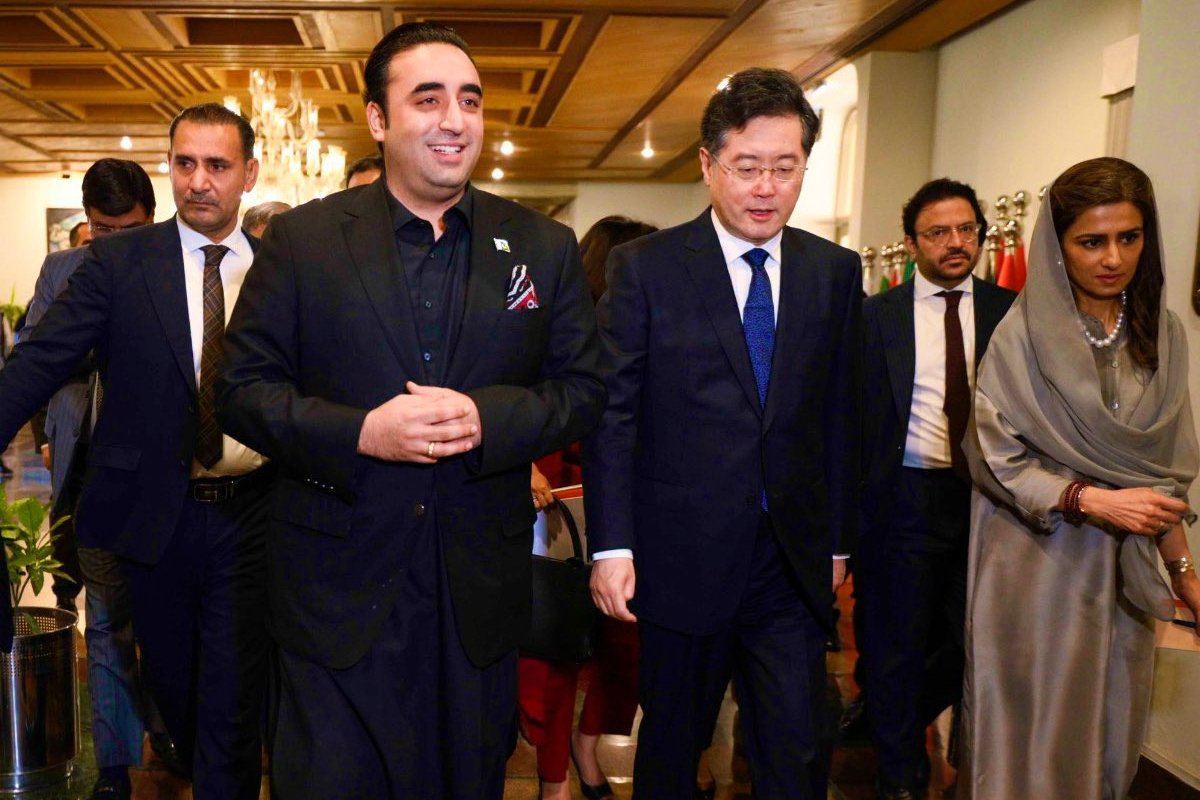‘Amreeka ke ghulamon, aaj tumhe nahi chhodenge. Hamare Kaptan ko chhod do, nahi toh poora Pakistan jala denge. (Slaves of America, we won’t leave you today. Let our captain go, or we’ll burn all of Pakistan).’
Those words of a protestor on a Pakistani street on Wednesday (part of a viral video) gave a glimpse of a stark fact: many Pakistanis view the arrest of former prime minister Imran Khan as a political chess move in favour of the US.
They blame the country’s army, particularly army chief, General Asim Munir and Major-General Faisal Naseer, a very senior ISI officer who has come to be known by the monicker ‘Dirty Harry’ for Khan’s arrest. Many citizens have openly called these officers traitors to their country, holding that the army brass is promoting the US’s agenda.
The US has often been blamed for stirring up rebellion in countries across the world, including the ‘Maidan’ uprising in Ukraine some years ago. But this time, the boot is on the other foot. The widespread protests across Pakistan are targeting the US.
This stems partly from the fact that Imran Khan himself publicly alleged last year that the US was behind his ouster from power. In response, Munir’s mentor, previous army chief Qamar Bajwa, had publicly highlighted Pakistan’s strong and abiding relations with the US.
Bajwa apparently ensured Munir’s installation. Khan had, it seems, wanted to install another officer, who had served as a powerful head of the ISI intelligence wing of the army. He too no doubt retains loyalists. Fissures in the top ranks of the Pakistan Army became apparent for the first time during Bajwa’s six-year term.
ALSO READ: How deeply is Pakistan’s army divided over Imran Khan imbroglio?
All this makes the current uprising in Pakistan seem a little like the uprising against the Shah of Iran in the late ‘70s rather than (perhaps even the opposite of) Ukraine’s ‘Maidan’ demonstrations, or the more recent uprising in Sri Lanka – each of which resulted in a change of government.
Global powers at play?
A huge question mark hangs over whether another power may covertly be fanning these flames of rebellion.
China might well play such a role, for Pakistan has been mentored by both the US and China ever since the ‘50s. Today, China has a greater stake in holding sway over Pakistan than does the US.
Pakistan’s ties with the US were always out in the open; Pakistan was part of the Central Treaty Organisation (CENTO) alliance which was formed by the US and UK in 1955 with Turkey, Iran, and Pakistan – which they called ‘frontline states’ against the Soviet Union during the Cold War.
China’s association with Pakistan was not so open but was strong nevertheless. The Karakoram Highway, now the artery of the China-Pakistan Economic Corridor (CPEC), began to be built in 1959.
At the time, the US was happy enough with Pakistan’s association with China. They used Pakistan as a middleman to arrange Secretary of State Henry Kissinger’s visit which broke the ice with China in the early ‘70s. (It was India that some US leaders detested at that time.)
Now that China is emerging as the second superpower, it would wish to play a covert role in shaping political outcomes in countries across the world. There were signs of Chinese involvement behind the scenes of violence during the mass ‘Black Lives Matter’ demonstrations in the US in 2020.
China would be especially concerned about outcomes in Pakistan, which it has called an ‘iron brother’ and its closest strategic ally. Especially at a time when it has drawn Saudi Arabia away from the US and into its orbit – along with Iran – China would not want to lose the geographical route to West Asia that Pakistan offers. It has vouchsafed $60 billion for CPEC projects.
Pakistan Foreign Minister Bilawal Bhutto Zardari may tilt Westward, but his deputy, Hina Rabbani Khar, recently stated publicly that China is Pakistan’s main strategic ally.
Notably, China was perhaps the first country to ask its citizens to leave Pakistan, quite soon after Khan’s arrest on Tuesday. Major Western powers, and India, apparently issued similar advice later. One wonders if the Chinese embassy had a sense of how violent and chaotic the protests would turn.
The decision to haul in Khan for arrest by dragging him out of a courtroom was probably taken within Pakistan. One wonders, though, how closely those in charge of the army now consult their Chinese friends.
The way former President Hu Jintao was hauled out of the Chinese Communist Party Congress last October – not to speak of the regime’s Tiananmen Square actions in 1989 – shows that China would think nothing of using strong-arm tactics to pick up a political opponent, and to put down protests.
David Devadas is a journalist and security, politics and geopolitics analyst.
Disclaimer: Views expressed above are the author’s own

